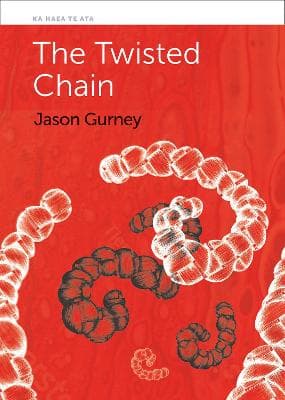Review: The Twisted Chain, by Jason Gurney
Reviewed by Rachel Webb
Gurney writes from a unique vantage point. He is a highly respected public health academic and cancer epidemiologist at the University of Otago, but more importantly, understands the lifelong impact that rheumatic fever can have on a family.
The origins of germ theory, the discovery of Group A strep and how it can trigger the immune system into rheumatic fever and chronic rheumatic heart disease, are explained in a lively and engaging voice. Each phase of this story is woven around his father Keg’s experiences. Gurney describes how Keg contracted Strep throat as a teenager after a rugby tournament in his early teens. Using a battlefield analogy, Gurney brings the immune system response to life more vividly and memorably than any medical textbook. He chronicles key milestones in this history of this disease - how rheumatic fever was first recognised at the turn of the 20th century, the decades in the early and mid-20th century when hospitals were full of rheumatic fever patients, and the discovery of penicillin and its role in the treatment and prevention of Group A strep infection and rheumatic fever.
Gurney then explains the history of prevention and control initiatives in Aotearoa, including his own important role in the ground-breaking rheumatic fever risk factors study – the most rigorous study in the world to identify risk factors for rheumatic fever. Around the same time, Keg and his family were navigating the frightening complications of chronic rheumatic heart disease. Gurney’s account of late-night visits to the emergency department at Middlemore Hospital with Keg will resonate with anyone who has brought a loved one to hospital terrified in the small hours, or any nurse or doctor who has worked night shifts in a heaving ED.
Rheumatic fever is a disease like few others. Its impact runs across the lifespan and intersects with every nook and cranny of the health system – primary care, emergency departments, hospital wards, maternity services, anaesthesia, child health and dental services. It is a barometer of how well (or badly) our health, welfare and housing systems are functioning.
I am a paediatrician at Middlemore Hospital. We continue to see children and teenagers like Keg in our hospital wards. Rugby and netball players in their early teens with damaged hearts, some on the cusp of needing heart surgery. Last month at Middlemore, six children with rheumatic fever were hospitalised, their families’ lives changed forever. Rates of rheumatic fever in South Auckland are the highest they have been in over a decade. With case numbers rising, Gurney calls us to action. He advocates with clarity for much-needed commitment across the political spectrum to tackle our national shame – the cold, damp, crowded houses responsible for so much sickness and the appalling life expectancy gap for Māori and Pacific peoples with rheumatic heart disease.
This book is essential reading for healthcare workers in Aotearoa, and for anyone interested in the history of infectious diseases and the connection between politics and health.
Through Keg’s story, Gurney demonstrates the power of lived experience. Stories can help us understand the problem and the science and create a stronger case for action.
The late Professor Dinny Lennon, who worked on the rheumatic fever risk factors study with Gurney and Professor Baker before her sudden death in 2018, would have been proud and delighted to read this book.
Ngā mihi nui.
Rachel Webb is a paediatric infectious diseases doctor who works at Middlemore and Starship Hospitals.
